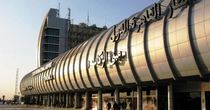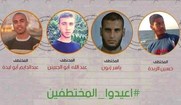22 dec 2016

A Palestinian fisherman was badly injured when an Egyptian gunboat opened fire at him on Wednesday evening as he was fishing off the coast of Rafah area, south of the Gaza Strip.
Chief of the fishermen Nizar Ayyash told the Palestinian Information Center (PIC) that fisherman Ahmed Abu Muhsen was admitted to hospital in Gaza for medical treatment.
Ayyash added that the fisherman suffered a moderate-to-serious bullet injury in his chest after an Egyptian gunboat randomly opened fire at him.
It is still unclear why the Egyptian navy attacked the fisherman.
It was not the first time the Egyptian navy opened fire at Gaza fishermen. In November 2015, a naval force shot and killed an 18-year-old fisherman called Faris Miqdad.
Chief of the fishermen Nizar Ayyash told the Palestinian Information Center (PIC) that fisherman Ahmed Abu Muhsen was admitted to hospital in Gaza for medical treatment.
Ayyash added that the fisherman suffered a moderate-to-serious bullet injury in his chest after an Egyptian gunboat randomly opened fire at him.
It is still unclear why the Egyptian navy attacked the fisherman.
It was not the first time the Egyptian navy opened fire at Gaza fishermen. In November 2015, a naval force shot and killed an 18-year-old fisherman called Faris Miqdad.
5 dec 2016

Hamas Movement called on the Egyptian authorities to open Rafah crossing permanently to end the suffering of Gaza inhabitants.
In a statement after recovering the bodies of two Palestinians who died in a tunnel, which was flooded by the Egyptian army with wastewater, Hamas Movement consoled on Monday the families of the martyrs and said that the martyrs have sacrificed their lives trying to provide sustenance for their families.
Hamas denounced the tragic incident, while stressing that there was no justification for using such methods in dealing with Gazans.
Civil defense crews recovered on Sunday two bodies of four Palestinian workers who went missing in a tunnel near the Egyptian borders nine days ago.
In a statement after recovering the bodies of two Palestinians who died in a tunnel, which was flooded by the Egyptian army with wastewater, Hamas Movement consoled on Monday the families of the martyrs and said that the martyrs have sacrificed their lives trying to provide sustenance for their families.
Hamas denounced the tragic incident, while stressing that there was no justification for using such methods in dealing with Gazans.
Civil defense crews recovered on Sunday two bodies of four Palestinian workers who went missing in a tunnel near the Egyptian borders nine days ago.
4 dec 2016

The bodies of four Palestinian workers were removed Sunday from a border tunnel between Egypt and blockaded Gaza.
Speaking on condition of anonymity, security sources said four Palestinian workers who had gone missing last week were found dead in an underground tunnel.
Meanwhile, medics said four dead bodies were received at Abu Youssef al-Najar Hospital, in Rafah city, to the south of Gaza Strip.
Over recent years, a number of Palestinian workers were killed in border tunnels after the Egyptian military flooded the border area between the Egyptian part of Rafah city and the besieged Gaza Strip with sea water, demolishing a number of tunnels.
An Israeli blockade severely restricts the movement of people and goods into and out of the territory, and Egypt's sole border with Gaza—Rafah crossing—has also remained largely closed since the toppling of the democratically elected President Mohamed Morsi in 2013.
In light of Egypt's systematic attempts to destroy the tunnels in Gaza and keep a tight rein on the border area, the tunnels have remained Gaza’s sole passageway and have long been used to enter much-needed goods and life-saving medicines to over two million inhabitants in the coastal enclave. However, at present smuggling across those tunnels had come to a halt due to the Egyptian vast destruction of the border area and flooding it with water.
Bodies of Missing Palestinian Civil Defense Workers Found in Rafah
Palestinian Civil Defense crews found, early Sunday, the bodies of four Palestinian workers who had been missing for over a week, in a commercial tunnel on the Egyptian border with Rafah.
The defense crews said, according to Al Ray, that three of the workers were identified as Sami Altaweel, 30, Ali Badawi, 45, Emad Badawi, 24, from Rafah, south of Gaza, while the fourth was identified as Muhammad Badawi, 22, from Nuseirat, central Gaza Strip.
The defense crews said that the four workers had been missed after the Egyptian army flooded the tunnel they were working in.
Speaking on condition of anonymity, security sources said four Palestinian workers who had gone missing last week were found dead in an underground tunnel.
Meanwhile, medics said four dead bodies were received at Abu Youssef al-Najar Hospital, in Rafah city, to the south of Gaza Strip.
Over recent years, a number of Palestinian workers were killed in border tunnels after the Egyptian military flooded the border area between the Egyptian part of Rafah city and the besieged Gaza Strip with sea water, demolishing a number of tunnels.
An Israeli blockade severely restricts the movement of people and goods into and out of the territory, and Egypt's sole border with Gaza—Rafah crossing—has also remained largely closed since the toppling of the democratically elected President Mohamed Morsi in 2013.
In light of Egypt's systematic attempts to destroy the tunnels in Gaza and keep a tight rein on the border area, the tunnels have remained Gaza’s sole passageway and have long been used to enter much-needed goods and life-saving medicines to over two million inhabitants in the coastal enclave. However, at present smuggling across those tunnels had come to a halt due to the Egyptian vast destruction of the border area and flooding it with water.
Bodies of Missing Palestinian Civil Defense Workers Found in Rafah
Palestinian Civil Defense crews found, early Sunday, the bodies of four Palestinian workers who had been missing for over a week, in a commercial tunnel on the Egyptian border with Rafah.
The defense crews said, according to Al Ray, that three of the workers were identified as Sami Altaweel, 30, Ali Badawi, 45, Emad Badawi, 24, from Rafah, south of Gaza, while the fourth was identified as Muhammad Badawi, 22, from Nuseirat, central Gaza Strip.
The defense crews said that the four workers had been missed after the Egyptian army flooded the tunnel they were working in.
19 nov 2016

The Egyptian authorities refused to grant the Palestinian volleyball team visas to enter the country to participate in the Arab championship in Cairo.
The Palestinian volleyball team coach Munir Talahmeh told Quds Press that the Egyptian authorities refused to grant entry visas to five players for unknown reasons.
The Palestinian Volleyball Union submitted a protest to the Arab and Egyptian unions in rejection of the Egyptian decision to prevent the West Bank players’ participation in the Arab championship.
Meanwhile, seven Palestinian players from Gaza Strip have been allowed to enter the Egyptian territories to participate in the championship.
The Palestinian volleyball team coach Munir Talahmeh told Quds Press that the Egyptian authorities refused to grant entry visas to five players for unknown reasons.
The Palestinian Volleyball Union submitted a protest to the Arab and Egyptian unions in rejection of the Egyptian decision to prevent the West Bank players’ participation in the Arab championship.
Meanwhile, seven Palestinian players from Gaza Strip have been allowed to enter the Egyptian territories to participate in the championship.
29 oct 2016

Thousands of Palestinian marched late Friday in al-Bureij refugee camp in central Gaza Strip in solidarity with the four kidnapped Gazan youths in Egypt and in support of Palestinian prisoners in Israeli jails.
In his speech at the event, Director General of the Internal Security Forces Major General Tawfiq Abu Naim called on Egyptian authorities to release the four kidnapped youths as they were traveling via Rafah crossing for treatment and study purposes.
The four kidnapped youths’ case is one of our top priorities, he stressed, calling for an immediate end to their suffering.
On the other hand, Abu Naim pointed out that Palestinian administrative detainees’ number has reached 1000 in Israeli jails following Jerusalem Intifada.
Several prisoners are completely isolated in Israeli jails, while thousands others suffer different health problems, dozens of them suffer chronic diseases, Abu Naim added.
For his part, the leader in Hamas Movement Mussa Abu Samak stressed the necessity of releasing the four abducted men and ending their suffering.
Relatives of the abducted four youths have also participated in the event, demanding the safe return of their sons.
In his speech at the event, Director General of the Internal Security Forces Major General Tawfiq Abu Naim called on Egyptian authorities to release the four kidnapped youths as they were traveling via Rafah crossing for treatment and study purposes.
The four kidnapped youths’ case is one of our top priorities, he stressed, calling for an immediate end to their suffering.
On the other hand, Abu Naim pointed out that Palestinian administrative detainees’ number has reached 1000 in Israeli jails following Jerusalem Intifada.
Several prisoners are completely isolated in Israeli jails, while thousands others suffer different health problems, dozens of them suffer chronic diseases, Abu Naim added.
For his part, the leader in Hamas Movement Mussa Abu Samak stressed the necessity of releasing the four abducted men and ending their suffering.
Relatives of the abducted four youths have also participated in the event, demanding the safe return of their sons.
26 oct 2016

While an initial IDF investigation of the shooting incident that cost the life of 15-year-old Nimer Abu Amar finds that Egyptian forces opened fire due to confusion, a family member who was present at the site says that the Egyptian forces were informed that they were working for Israel before deciding to open fire; neither the IDF nor the Israeli Defense Ministry has sent a representative to offer their respects to the family.
After 15-year-old Nimer Bassem Abu Amar from the Bedouin town of Lakiya was shot and killed by Egyptian Army forces on Tuesday, Israeli security forces are trying to understand who was responsible for the tragic event.
The family is laying the blame on the Israeli security forces for abandoning Abu Amar, while the Defense Ministry has been trying to understand why the boy was in an area prone to fire, whether anyone was overseeing the entry of people over the border, and whether there were any instructions in place.
A preliminary IDF investigation found that Abu Amar, who was there to do construction work along the border fence with other members of his family, was mistaken as being on the Egyptian infiltrator by Egyptian soldiers. Abu Amar died while on his way to Soroka Medical Center.
Another report, though, contradicted the IDF report's conclusions. Visiting the mourning tent, one of the other workers who was present that day said that the Egyptian Army was told they were working for the IDF before they opened fire. "The (Israeli) Army is usually with us while we work. We were weeding around the area, when suddenly, an Egyptian Army squad car drove up, and an officer asked, 'Who do you belong to?' We told him we belong to the Israeli side.
The officer then said, 'You're not allowed to be here.'As we were making our way toward the exit, I heard the officer say, 'Start shooting now.' Nimer was the fourth from the front when he was injured. The Egyptian squad car immediately drove away. Within minutes, the army arrived and took care of him, and they also called a helicopter."
Apparently, the IDF soldiers realized that the Egyptian Army was firing due to mistakenly thinking Abu Amar had entered Egyptian territory and therefore held their fire. Instead, it extracted the boy, who was hit by a single bullet, and administered initial medical treatment. Both armies are currently cooperating to fully understand what led to the incident.
Though it did not send a representative to the family's mourning tent, the Defense Ministry referred to the incident in a statement, saying, "The Defense Ministry is conducting an investigation over the details of the shooting incident at the border fence with Egypt. A preliminary investigation found that Abu Amar arrived at the site with members of his family who worked for a deputy contractor, who hired them under the civil contractor. The Defense Ministry is continuing with the investigation until the general circumstances will be clarified."
The border fence was completed in the area where the shooting took place more than two years ago. The Defense Ministry's investigation is focusing on whether the workers were properly supervised, since former cases have shown that when it comes to providing workers with security along the Egyptian and Jordanian borders, both the IDF and Defense Ministry have shirked responsibility. Normally, though, workers have a military force on hand for their safety.
Abu Amar is the fourth Israeli civilian in the last few years to be killed in a security incident while working along an Israeli border. Contractors usually bring their workers to the area along the border on a daily basis for ongoing infrastructure work. The contractors who win the tender try to maximize their profitability by having their workers carry on even in potentially dangerous areas with insufficient security.
'No one came to show their respect'
There has yet to be a single IDF or Defense Ministry representative to visit the family's mourning tent in Lakiya. Salah Abu Amar, the boy's cousin, accused the security forces of racism. "If a Jewish boy would have been killed, it would be different. They abandoned the boy. Where's the army? Is there a shortage of soldiers in Israel? No one came to show their respect. You could come and say it was an accident, that can happen, we're all people."
The cousin continued to say, "Someone from the Defense Ministry called me to ask if it was okay to come. Why would it not be okay? Half of his family was in the army. Nimer's father was in the army and was commissioned for additional service. It's a disgrace. No one will bite them if they come. At a minimum, we expected them be at the hospital and sit with his father."
Abu Amar's uncle also criticized the IDF: "I blame the army. How could they let a little kid enter such a dangerous area? The Israeli soldiers abandoned the workers to their fate. Five family members could have died in that incident. There was neglect before and after his death. Either way, the life of an Arab citizen is apparently worth nothing."
Bassem, Abu Amar's father, came out strongly against the Israel Defense Forces: "I blame the Defense Ministry for the death of my son. There was no IDF security over the workers during the work itself. The soldiers left and only returned once they heard the gunshots, and even then they did not respond."
"Where's the prime minister?" He asked "Where's the defense minister? It's very simple: the army abandoned the guys working there."
After 15-year-old Nimer Bassem Abu Amar from the Bedouin town of Lakiya was shot and killed by Egyptian Army forces on Tuesday, Israeli security forces are trying to understand who was responsible for the tragic event.
The family is laying the blame on the Israeli security forces for abandoning Abu Amar, while the Defense Ministry has been trying to understand why the boy was in an area prone to fire, whether anyone was overseeing the entry of people over the border, and whether there were any instructions in place.
A preliminary IDF investigation found that Abu Amar, who was there to do construction work along the border fence with other members of his family, was mistaken as being on the Egyptian infiltrator by Egyptian soldiers. Abu Amar died while on his way to Soroka Medical Center.
Another report, though, contradicted the IDF report's conclusions. Visiting the mourning tent, one of the other workers who was present that day said that the Egyptian Army was told they were working for the IDF before they opened fire. "The (Israeli) Army is usually with us while we work. We were weeding around the area, when suddenly, an Egyptian Army squad car drove up, and an officer asked, 'Who do you belong to?' We told him we belong to the Israeli side.
The officer then said, 'You're not allowed to be here.'As we were making our way toward the exit, I heard the officer say, 'Start shooting now.' Nimer was the fourth from the front when he was injured. The Egyptian squad car immediately drove away. Within minutes, the army arrived and took care of him, and they also called a helicopter."
Apparently, the IDF soldiers realized that the Egyptian Army was firing due to mistakenly thinking Abu Amar had entered Egyptian territory and therefore held their fire. Instead, it extracted the boy, who was hit by a single bullet, and administered initial medical treatment. Both armies are currently cooperating to fully understand what led to the incident.
Though it did not send a representative to the family's mourning tent, the Defense Ministry referred to the incident in a statement, saying, "The Defense Ministry is conducting an investigation over the details of the shooting incident at the border fence with Egypt. A preliminary investigation found that Abu Amar arrived at the site with members of his family who worked for a deputy contractor, who hired them under the civil contractor. The Defense Ministry is continuing with the investigation until the general circumstances will be clarified."
The border fence was completed in the area where the shooting took place more than two years ago. The Defense Ministry's investigation is focusing on whether the workers were properly supervised, since former cases have shown that when it comes to providing workers with security along the Egyptian and Jordanian borders, both the IDF and Defense Ministry have shirked responsibility. Normally, though, workers have a military force on hand for their safety.
Abu Amar is the fourth Israeli civilian in the last few years to be killed in a security incident while working along an Israeli border. Contractors usually bring their workers to the area along the border on a daily basis for ongoing infrastructure work. The contractors who win the tender try to maximize their profitability by having their workers carry on even in potentially dangerous areas with insufficient security.
'No one came to show their respect'
There has yet to be a single IDF or Defense Ministry representative to visit the family's mourning tent in Lakiya. Salah Abu Amar, the boy's cousin, accused the security forces of racism. "If a Jewish boy would have been killed, it would be different. They abandoned the boy. Where's the army? Is there a shortage of soldiers in Israel? No one came to show their respect. You could come and say it was an accident, that can happen, we're all people."
The cousin continued to say, "Someone from the Defense Ministry called me to ask if it was okay to come. Why would it not be okay? Half of his family was in the army. Nimer's father was in the army and was commissioned for additional service. It's a disgrace. No one will bite them if they come. At a minimum, we expected them be at the hospital and sit with his father."
Abu Amar's uncle also criticized the IDF: "I blame the army. How could they let a little kid enter such a dangerous area? The Israeli soldiers abandoned the workers to their fate. Five family members could have died in that incident. There was neglect before and after his death. Either way, the life of an Arab citizen is apparently worth nothing."
Bassem, Abu Amar's father, came out strongly against the Israel Defense Forces: "I blame the Defense Ministry for the death of my son. There was no IDF security over the workers during the work itself. The soldiers left and only returned once they heard the gunshots, and even then they did not respond."
"Where's the prime minister?" He asked "Where's the defense minister? It's very simple: the army abandoned the guys working there."
